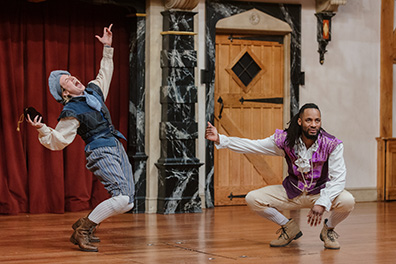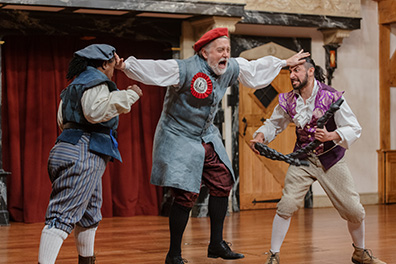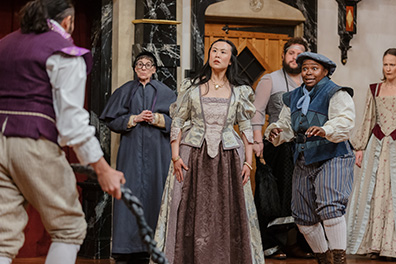The Comedy of Errors
Blackfriars Vet Brews a Brilliant Circe’s Cup
American Shakespeare Center, Blackfriars Playhouse, Staunton, Virginia
Sunday, April 20, 2025, E–8 (Stalls, center)
Directed by Chris Johnston

Above, Dromio of Syracuse (Summer England, left) has the money for her mystified master, Antipholus of Syracuse (Rasell Holt). Below, the angry Antipholus of Ephesus (Joe Mucciolo, right) got a rope instead of money from his servant Dromio of Ephesus (Raven Lorraine, left) as the Officer (Christopher Seiler) keeps them apart in the American Shakespeare Center's production of William Shakespeare's The Comedy of Errors at the Blackfriars Playhouse in Staunton, Virginia. Photos by Lindsey Walters.

Chris Johnston has been a great musician from the time I’ve known him. To define that “known him” caveat, I’ve only known him as an actor in American Shakespeare Center productions at the Blackfriars Playhouse from 2011 to 2019 (I met him in person once, briefly, at a theater gala). Over those years, I watched Johnston also evolve into an outstanding actor.
He returned to the Blackfriars Playhouse as director of William Shakespeare’s The Comedy of Errors during this year’s spring season. In that role, he helmed a production that proved to be every bit a reflection of the multitalented actor himself, delivering Shakespeare’s multidimensional text and crazier than crazy plot with juxtapositions of clowning and emotional breadth, slapstick and psychological depth, textual purity and meta magic. Provided a company with superior physical, textual, and character acting skills and musical talent, Johnston’s Blackfriars Playhouse directorial debut captured a decade of his own theatrical brilliance in two-hours traffic on the stage he had plied so well.
The Blackfriars Playhouse, in the small Appalachian foothill’s town of Staunton, Virginia, is the world’s only re-creation of Shakespeare’s indoor theater. True to its playhouse's purpose, the American Shakespeare Center adheres to original production practices that Shakespeare’s company would have used in their original indoor theater.
- The thrust stage has audiences in close proximity, so close that six “gallant stools" are lined up on each side of the stage.
- No digital effects, not even electronics except the chandelier-replica houselights which remain on throughout the show. All music and sound effects are accomplished acoustically.
- No sets. Only props and costumes establish the setting. Only textual descriptions establish the scene (e.g., storms on the heath, a dark night, or, in this play, the street).
- With cross-gendered casting going both ways, actors play multiple roles in each play, and the plays rotate in a repertoire of three productions per season.
- Actors use direct-address deliveries to the audience throughout the play, encourage vocal responses, and often include audience members in the action.
- The pre-show and intermission music aligns with Elizabethan theater practice of using period pieces—not the period of the play's composition but the play's performance. Thus, for this Comedy of Errors, the cast performed Jamestown Revival's “Fur Coat Blues,” Muse's “Apocalypse Please,” The Georgia Satellites' “Keep Your Hands to Yourself,” and a mashup of Emcee Rob Base and DJ E-Z Rock's "It Takes Two" and Grover Washington Jr. and Bill Withers's “Just the Two of Us.” All acoustically performed, of course.
Johnston’s experience in playing the Blackfriars guaranteed that this production would have no imaginary fourth wall—nor third or second wall, for that matter: only a black curtain at the back of the stage. The stage was bare, but he opted for Elizabethan-style costuming so elaborate credit goes to two designers, Marie Lupia and Amy Monsalve, and a shout-out to Trina Yager, the wardrobe supervisor and stitcher.
Opposite of what you might expect from such “original practice” trappings, they actually free Shakespeare’s texts for modern audiences. From the mouths of actors trained in speaking them, the plays reverberate with a clarity most 21st century ears don’t hear coming. Can a character score laughs today with two extended sequences of obtuse punning about a police officer? Summer England as Dromio of Syracuse accomplished that in this production by fully understanding the words' meanings and letting their aurally silly syllables, tonal qualities, and rhythmic chaos deliver the comic goods without any accompanying physical antics.
I’ve long contended that The Comedy of Errors is the forefather to Looney Tunes cartoons. Johnston, who played Dromio of Ephesus in a 2014 production at the Blackfrairs, goes further, demonstrating how Shakespeare invented Monty Pythonesque cinema, including The Princess Bride and Airplane!, wherein the actors play the lunacy totally straight.
Quick plot summary. Emilia, the wife of a merchant of Syracuse named Egeon, gave birth to identical twins. Both are named Antipholus (how they ended up with the same name is a bit obtuse). In the inn where Emelia gave birth, a poor couple also birthed identical twins, both named Dromio for the same obtuse reason. Egeus purchased them to be servants to his sons. On their trip home, the family was separated in a sea storm, leaving each parent with an Antipholus and Dromio. About 20 years later, Egeon’s half pair of twins decided to leave their Syracuse home to search for their brothers. After a couple more years, Egeon went in search of them.
Egeon provides this back story after landing in Ephesus, which happens to be in a trade war with Syracuse so serious that the two city states will put to death any resident of the other city arriving in their territory. Thus is Egeon (Blackfriars vet Christopher Seiler) condemned to die. After Egeon tells the Duke of Ephesus (Blake Henri) his life’s story, the Duke takes pity and gives Egeon a day to raise bail money or he’ll be executed at sundown. By happenstance, Egeon's Antipholus and Dromio have also just landed in Ephesus, but they make sure they don’t identify as being from Syracuse. And, guess what: the other Antipholus and Dromio already live in Ephesus. Emilia is the lone family member unaccounted for.
A production has four choices in casting this elaborate joke of doubled mistaken identities:
- Have two pairs of actors who look alike play the four lead roles
- Have single actors doubling as Antipholus and Dromio
- Have the company wearing masks
- Have the audience pretend the characters wearing similar clothing look identical.
I’ve seen all four approaches. The one that does not work on stage is the second: doubling two actors inevitably leads to an unsatisfactory all-hands reveal at the end. It does, however, work on film. The first Comedy of Errors my wife, Sarah, saw was the BBC version with Michael Kitchen playing the two Antipholi and Rogar Daltry playing the two Dromios. Two-thirds through, Sarah suddenly said, “They’re twins?!” Look-alike and masked actors can achieve a similar reaction in stage productions: when a Dromio delivers a rope to an Antipholus who was expecting him to bring a purse of money, I've joined my fellow patrons in didn't-see-that-coming laughter despite knowing this play so well.
While look-alike actors, doubling, and masks can amp up the confusion quotient, relying on audience imagination can amp up the comedy quotient. It’s especially ideal for a company such as the American Shakespeare Center, fiscally restricted to nine-actor repertory companies and adhering to the production values of a playwright who specifically exhorts his audience (through Henry V's Chorus) to “let us, ciphers to this great account, on your imaginary forces work.”
Johnston not only knows how to get audiences’ imaginary forces working but also has experienced how Blackfriars meta moments inspire the biggest laughs and purest appreciation of live theater. He confidently took the non-identical casting approach to extremes. His Antipholus of Syracuse was Rasell Holt, a tall black guy. His Antipholus of Ephesus was Joe Mucciolo, an average-height white guy. England as Dromio of Syracuse is a thinnish white woman. Raven Lorraine as Dromio of Ephesus is a larger black woman. That Adriana (Charlene Hong White) and her sister, Luciana (Leah Gabriel), would therefore mistake the Syracuse Antipholus for their husband and brother-in-law, respectively, along with his servant was ludicrous. Nevertheless, Johnston expected the audience to roll with it and even found ways to spike the humor of the mismatched twins, such as Adriana noting how tall her husband had grown since breakfast. The two Dromios also were curious at the height adjustments of their masters over the course of their incredibly weird day.
The Comedy of Errors is ripe for many other meta theater moments, and this production had plenty, such as Lorraine’s Dromio of Ephesus trying to pry open a locked door with a hat worn by a woman sitting on a gallant stool. A gallant stool occupant on the other side of the stage found himself identified by a Dromio (of Ephesus, I think) as “the rope maker” and consequently targeted for exorcism by Dr. Pinch.
Oh, my goodness, Dr. Pinch: this charlatan exorcist enlisted to cure Antipholus and Dromio of their diagnosed madness was played by the incomparable Angela Iannone. She’s attained that adjectival label over the past two years at the Blackfriars for her singular yet spot-on takes on even the most minor of Shakespeare’s characters. She also uses a wide array of voices playing those characters. In addition to Dr. Pinch, she played Angelo, the goldsmith, who could have been from the Sicilian Syracuse given her strong Italian accent and mafia bearing as she tried to get payment for the “chain-NAH” she’d sold to Antipholus (of Syracuse though Angelo gave it to the Ephesian Antipholus, therein causing the goldsmith's conundrum). Her pronunciation of “chain-NAH” was soon echoed by other characters, though it might have been the actors themselves suffering a case of earworm.
But it was her Pinch that rose to the heights of Blackfriars lore, given how many people I heard say, “Wait 'till you see her Pinch,” before I did see it—and hear it. Iannone shares this Pinch lore with the esteem she earned for her King Lear playing in repertory with The Comedy of Errors. Hers was one of the most viciously stern and virile Lear’s I’ve ever seen. Wearing a Renaissance justice's robe, cowl, skull cap, and authentic round eyeglasses, Iannone channeled her Lear’s virile attitude as her Pinch preached brimstone in a helium balloon-sucking voice. Then she used a Vulcan nerve grip to subdue Antipholus, who fell to the floor, stretched out on his back, spinning in circles with his entire body twitching while speaking his lines. “The fiend is strong within him,” Pinch squeaked so matter-of-factly it enhanced the visual humor with a textual resonance that can’t get any more ridiculous. Oh, but it did. “Go bind this man, for he is frantic too,” Pinch says, and Iannone nerve pinched Dromio, too. Master and man both were doing the twirling twitch (somebody could write a song to that and create the next great party dance craze).
By the way, the textually savvy Iannone was presenting a purely Shakespearean reading of Pinch's actions. "It is no shame: the fellow finds his vein and, yielding to him, humors well his frenzy," Pinch says. Vein, nerve, close enough, it's a suitable pinch for Iannone's Pinch. The helium voice, however, has no textual anchor that I can find, but it its primary purpose is leaving an audience in laugh-inducing tears.

Antipholus of Ephesus (Joe Mucciolo, left) is accosted by his wife, Adriana (Charlene Hong White) and, behind her from left, Dr. Pinch (Angela Iannone), the Courtesan (Blake Henri), Dromio of Ephesus (Raven Lorraine), and Luciana (Leah Gabriel) in the American Shakespeare Center production of The Comedy of Errors. Photo by Lindsey Walters.
Physical humor is integral to The Comedy of Errors, much of that in violent beatings. Dromio of Ephesus even has a 10-line soliloquy on the near-constant beatings he’s endured from his master. Johnston didn't back away from the scripted violence, but the stunts were along the lines of pro wrestling setups. Furthermore, the violence often backfired on the perpetrator, usually an Antipholus, thanks to Dromio’s nimble escapes. Even in 2025 America that is acceptably funny.
While Johnston’s production was a marvel of slapstick humor, it also was thoroughly Shakespearean in its thematic throughlines. At the end of the intermission, the entire cast was dancing on stage, including Holt (Antipholus of Syracuse) with White (Adriana, the other Antipholus’s wife). Holt twirled a squealing White off stage and turned his attention on the sister, Gabriel's Adriana. Holt and Gabriel subtly displayed a yearning chemistry that carried through to the play’s wrap-up ending. Most of the characters are clowns, and all are funny, but this cast delivered deeply rendered emotions in their characters. Egeon is the sole fully tragic character, and Seiler managed to keep a tight grip on the audience’s hearts even during his long expository speech. Egeon’s tale also mesmerized the Duke as Henri believably shifted his despotic character (“well, Sy-Ra-Cu-San,” he addressed Egeon) into a compassionate man ("Hapless Egeon, whom the fates have marked to bear the extremity of dire mishap"). In Henri's expressed sincerity Egeon spied relief, were it not for the Duke's stated responsibility to uphold his government's written decrees. Henri later unleashed his full-on comic chops playing the Courtesan (thick beard and all—again, let your imaginary forces work), mimicking Antipholus of Syracuse’s overblown conjuring exhibit right back at him.
Such foundational acting skills beneath the cast’s comic capabilities paid off at the play's conclusion, one of the great reveals in show business history. It never fails to earn a gasp from audiences, and in this production, even after all the laughing had drained tear ducts dry, those ducts produced more moisture when the last member of Egeon’s torn-asunder family showed up in Ephesus. I base this testament not just on my own reaction in this 27th viewing of the play but the amount of sniffling I heard around me while my ears were still ringing from the gales of laughter leading up to the moment.
That is the magic of Shakespeare; and of Johnston, who has immersed the better part of his adult life performing Shakespeare plays in this playhouse. He not only knows how to perform the magic but make it ours, too. This production's overriding signature moment occurred in the final scene when Henri’s Duke comes upon the town folk gathered outside the abbey, where one pair of twins had taken refuge. After the Ephesians give contradicting testimony to the craziness they have witnessed, their Duke replies, “I think you all have drunk of Circe's cup.” Henri, however, did not address this line to the characters on stage; instead, he turned to the audience, suggesting we were the ones who had been magically transmogrified.
I’ll raise a cup to that.
Eric Minton
September 14, 2025
Comment: e-mail editorial@shakespeareances.com
Start a discussion in the Bardroom


